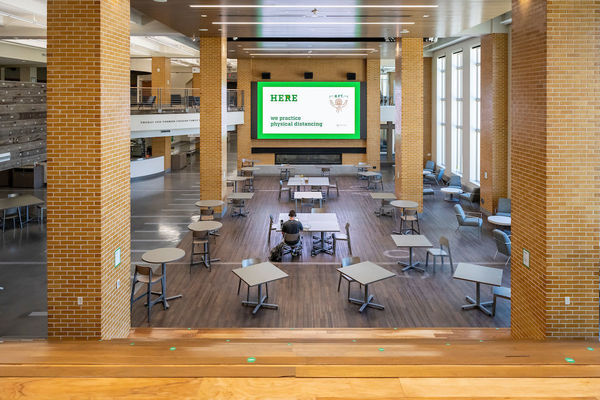

Student Center. (Photo by Barbara Johnston/
University of Notre Dame)
It’s lunchtime on Wednesday, Aug. 19, and the Notre Dame campus is quiet. In a virtually empty Duncan Student Center, the only sounds are a Sam Smith ballad playing on the speakers and custodian Betty Lou Wildrick pushing a wheeled trash bin across the concrete floors. Retail dining operations like Star Ginger are closed; so are the Smith Center for Recreational Sports and the climbing and bouldering wall. If you didn’t know better, you’d think it was the middle of the summer and students hadn’t yet moved in for the 2020-21 academic year.
Of course, students were on campus, but mostly in their residence halls, attending class through laptop computer screens. It was the ninth class day of the fall semester, but the first day of remote instruction. The previous afternoon, Tuesday, Aug. 18, University President Rev. John I. Jenkins, C.S.C., announced that in-person instruction would be suspended for undergraduates for two weeks to tamp down what had become a rapid spread of the coronavirus.
Back at Duncan, Wildrick pushes her wheeled trash bin from one space to another on the main floor. After wiping down the tables and chairs in the Jan and Marty Hiller Midfield Commons with disinfectant, Wildrick notices her supervisor, Angelica Salazar, coming over to check on her work.

Center with Betty Lou Wildrick. (Photo by Barbara Johnston/University of Notre Dame)
“I try to make my team feel secure about everything,” Salazar says about coaching her staff in these uncertain times. “I tell them, if we follow the safety protocols, we will all be OK.”
Salazar and Wildrick are two of the 375 mostly full-time workers in Building Services who are sanitizing, disinfecting and maintaining a safe campus. Their boss is Senior Director Chris Hatfield.
“Safety is the highest priority,” Hatfield said. “We’ve been in a continuous hiring mode since mid-July. We’ve hired at least 60 people in the last two months. We’re one of the only departments allowed to hire anyone since the hiring freeze started in March.”
Father Jenkins’ announcement that classes would move online did not discourage Hatfield. It seemed to have motivated him.
“We’re having meetings with our supervisors today to say, ‘Look, we’ve got to pull out all the stops right now. It’s now or never if we’re going to have students here this semester,’” Hatfield said. Since most classrooms will not be utilized until Wednesday, Sept. 2, at the earliest, many Building Services workers have been reassigned from academic buildings to residence halls.
“The residence halls are now more densely populated throughout the day. There’s more trash, more food, more people touching things. So we are upping our game, devoting more resources and more attention there,” Hatfield said.

His teams also prepare quarters off campus for students who need to quarantine or isolate. Hatfield, who served in the Navy, says the battle against the spread of the virus is an all-hands-on-deck situation.
“There’s a saying that when you’re on a ship and there’s a fire, everybody’s a firefighter. You’re all in it together. You have to work as a team to accomplish a mission. That’s what we’re trying to do,” he said.
A few buildings away, at Fitzpatrick Hall of Engineering, Building Services Crew Leader Larry Parker finishes up his shift. Without students and faculty around, the building is deserted and dark.
But, like Hatfield, Parker is not deterred by the uptick in cases; he is determined. “I hate that COVID is getting to our students. I hate it,” Parker said.
“I take pride in what my crew and I do because now we are saving lives. You look at a doctor or a nurse or a firefighter or police, well, now we are saving lives, too,” Parker said. “I tell my crew, this is your area, so take care of your area like you do at home. Take pride in it.”
Salazar agrees, “We are really important because it’s our hands that keep things clean and safe for students, for faculty and for staff.”
Originally published by at ndworks.nd.edu on August 24, 2020.